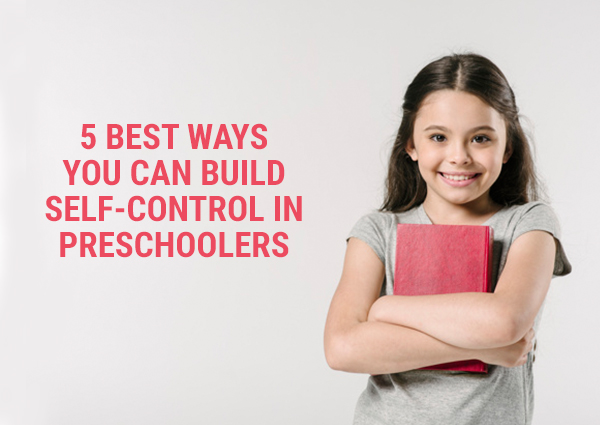5 Best Ways You Can Build Self-Control In Preschoolers
In the following we’ll be discussing about a crucial topic that’s “5 best ways you can build self-control in preschoolers” and will discuss about it thoroughly within the article. If you’ve got a toddler, odds are that “terrible twos” may be a term you’ll be able to identify with. In fact self -control is a big challenge that children face in the 2-5 year age bracket. Not without reason; while the brain shows tremendous development during this period, the prefrontal cortex that controls the executive functions including the power to focus and self-regulate, develops slower than the other areas of the brain. The good news however is that with clear guidance and patient parents, Preschoolers can actually tide over this phase. Here is what you’ll do in order to help or assist them:
Be A Role Model
Kids actually learn by observation more than any other way. There is therefore plenty of merit in modeling self- control that they’ll grow up emulating. Reacting to life’s stresses and strains with a lot of anger and emotions makes it an appropriate way to handle circumstances, in the child’s mind. The best thing to assist the kid develop self-control is therefore to regulate your own emotions. The next time around when the kid is anxious about something, if you talk soothingly to her while allaying her fears, you’re creating a precedent for her to talk to herself through life’s difficult situations. Similarly every time you rush in to help the kid , anxiety writ all over your face, to assist solve a problem that the kid can solve himself, you are limiting the child’s ability to problem solve, not to mention the fact that the kid is probably going to mirror your anxiety.
Avoid Any Sort Of Physical Punishment–
While you may actually be tempted to use physical punishment to make a long lasting impression on the child so that he does not repeat the errant behavior ever again, the fact is that physical punishment can actually do more harm than any good. If anything, it can cause feelings of resentment towards the parents as also establish the very fact that aggression is a suitable mode of behavior. Physical punishment and strict discipline can even impact the child’s self-esteem forever. Instead you’ll be able to use a whole lot of fun activities that help the kid understand the concept of discipline. So playing “green light” where the kid moves when you call out green light and freezes when you call out red light may be helpful to teach the kid the concept of rules. Similarly playing “Simon Says” is actually a great idea too!
Always Lay Clear Expectations
Be clear while actually giving directions or laying down any rules. “Reading time is quiet time” or “you actually need to take turns on the swing.” Short, clear instructions like these work well with children. Also remember to fill the kid in on what to expect in a particular situation. So if you’re visiting a relative, it’s best to tell the kid beforehand to carry some play stuff as adults will spend time talking. Being mentally prepared for the situation, the kid is less likely to throw a tantrum when the attention shifts away from him for a while.
You must help your child identify his/her feelings-
It is quite a good idea to help a child identify his/her feelings as well as to actually validate them. You could, therefore tell the kid that you seemed angry when your friend took away the toy. As long as you do not validate any bad behavior that comes with certain emotions, it’ll help the kid realize that experiencing all emotions is fine. Recognizing what he’s feeling will even help the kid to stop himself from having an outburst. Teaching language that helps in self-control can even be a handy tool. Equip the kid, thus, with sentences such as “May I borrow this you’ or “I will wait for my turn.”
Establish Routines
Young children benefit from having an If they know that snack time is typically followed by time out in the park; they are less likely to throw a tantrum while eating. It goes without saying that a good sleep is totally essential when it comes to children. Without it, they’re likely to be much more temperamental.


